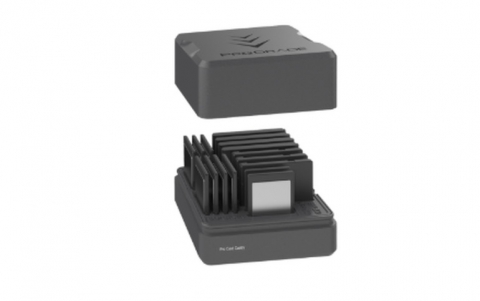
Sony to open up PSP media format
Sony has taken the first step toward opening up the proprietary UMD (Universal Media Disc) optical disc system used in its
PlayStation Portable (PSP) so that other companies can build products based on the discs, a senior executive said
Thursday.
UMDs are 60-millimeter optical discs in protective cases that have a data storage capacity of 1.8GB. They were developed
by Sony for use in the PSP, but plans already reach beyond gaming. Specifications for versions of UMD holding games,
movies and music have all been drawn up. However, at present the only commercial UMD content on the market is the
handful of games available for the PSP.
In the future, the company plans to broaden this to commercial movie and music content on UMD, said Ken Kutaragi, executive deputy president of Sony and president and CEO of Sony Computer Entertainment Inc, the company's computer game unit, speaking on Thursday at The Foreign Correspondents' Club of Japan.
"Many of the content publishers and studios and artists are eager to bring their content (to) and show their library on PSP," he said. "There is no other platform that can handle such a broad (range) of applications with this quality of sound and picture. This is really a first opportunity for everybody."
Sony will give companies access to the movie and music variants of the technology so that they might produce multimedia players that support UMD, he said. The company will keep the game format to itself and thus stop other companies from developing competing gaming products.
"We have already proposed UMD disc media as an open standard for everyone," he said. "The game profile will be unique for PlayStation Portable but movie and music should be a common application for everyone."
Sony submitted UMD to an international standards organization in late December, said Yoshiko Furusawa, a spokeswoman for SCEI. She wouldn't name the organization.
Kutaragi also said Sony plans to increase production of the PSP in the coming months. The PSP was launched in Japan on December 12. Long queues and shortages greeted the PSP and demand remains strong. As of January 9, sales of the PSP in Japan totaled 544,304 units, according to Media Create, which gathers sales data from retailers.
"We have shipped 800,000 PlayStation Portable as of today," said Kutaragi. "It's not a small number but its not big enough a number for the current market."
Total shipments of the PSP are expected to reach about 3 million [m] units by the end of March this year, said Kutaragi. The figure includes both units shipped in Japan and those sent to North America and Europe, where Sony said it will launch the PSP before the end of March.
"We will be increasing our capacity from 1 million (units) per month to 2 million (units) per month and in the summer period, for the selling season this year, we will be increasing to some crazy number, about 3 million a month," he said.
In the future, the company plans to broaden this to commercial movie and music content on UMD, said Ken Kutaragi, executive deputy president of Sony and president and CEO of Sony Computer Entertainment Inc, the company's computer game unit, speaking on Thursday at The Foreign Correspondents' Club of Japan.
"Many of the content publishers and studios and artists are eager to bring their content (to) and show their library on PSP," he said. "There is no other platform that can handle such a broad (range) of applications with this quality of sound and picture. This is really a first opportunity for everybody."
Sony will give companies access to the movie and music variants of the technology so that they might produce multimedia players that support UMD, he said. The company will keep the game format to itself and thus stop other companies from developing competing gaming products.
"We have already proposed UMD disc media as an open standard for everyone," he said. "The game profile will be unique for PlayStation Portable but movie and music should be a common application for everyone."
Sony submitted UMD to an international standards organization in late December, said Yoshiko Furusawa, a spokeswoman for SCEI. She wouldn't name the organization.
Kutaragi also said Sony plans to increase production of the PSP in the coming months. The PSP was launched in Japan on December 12. Long queues and shortages greeted the PSP and demand remains strong. As of January 9, sales of the PSP in Japan totaled 544,304 units, according to Media Create, which gathers sales data from retailers.
"We have shipped 800,000 PlayStation Portable as of today," said Kutaragi. "It's not a small number but its not big enough a number for the current market."
Total shipments of the PSP are expected to reach about 3 million [m] units by the end of March this year, said Kutaragi. The figure includes both units shipped in Japan and those sent to North America and Europe, where Sony said it will launch the PSP before the end of March.
"We will be increasing our capacity from 1 million (units) per month to 2 million (units) per month and in the summer period, for the selling season this year, we will be increasing to some crazy number, about 3 million a month," he said.





















